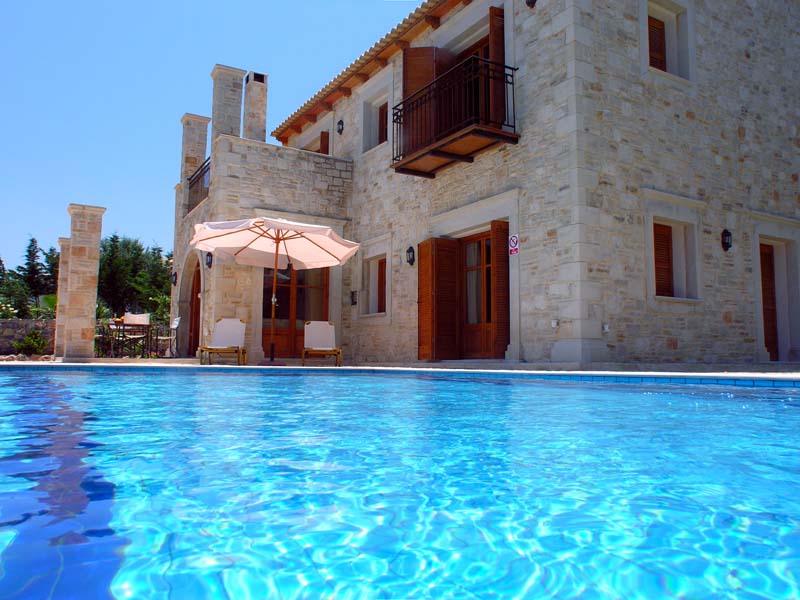Today we will discuss prices, but because it is a very large subject in itself, I will try to touch only those that are absolutely necessary.
Because I would like you to understand today’s discussion in the best possible way, I will use an example and the whole discussion will be based on this example.
So suppose you have two properties: an apartment in Athens, near the city center, that sleeps 4 people in 2 bedrooms, and a large seaside cottage, that sleeps 8 people in 4 bedrooms. You decide that based on the rental price in the area where the apartment is, for the capacity of 4 people, similar apartments seem to be rented at a final price of € 50 per night.
For the seaside cottage, houses of similar capacity in the area are rented at a final rental price of € 250 per night.
So let’s take a look at what happens in this case, when these two properties are listed on platforms for rent. First of all, the first thing a manager has to decide is whether he will have the same final price everywhere, on all platforms, or will have a different price per platform, based on how each platform handles its commissions. In other words, the apartment should have a final price of € 50 per night on all platforms, while the cottage will have € 250 per night. The second thing is for the manager to find out what he wants his earnings to be per night on his bank account, after the commission is taken by the platform. This, combined with the first, creates the following two price tag alternatives:
Same price on all platforms
If it is decided that the final price will be the same on all platforms, i.e. the pricing model known as ‘ rate parity ‘ is applied, this usually assumes the following: part of the price, and usually the first 20% is dedicated to pay the commission on whoever is involved in the rental process. However, this 20% works as a range of supplies, that is, we think in our mind that “we can give up to 20% commissions for platforms”. One of the positive points of this particular way of handling prices and supplies is that, having an up to 20% range for commissions, allows all platforms to try to fill the accommodation better. working all together with equal terms of final price.
Different price on platforms
In this scenario, the administrator creates the price that he wants, calculating either, a) that all the commissions will be added from above this price, or b) calculating the commissions attributed to the tenant and adding only those commissions from above the price, thus sharing the weight and reducing the differences. In our example with the cottage, where we have set a final price of € 250 per night, this means that the manager wants to get € 250 in bank earnings.
However, overnight prices vary significantly from platform to platform, resulting in a significant difference in the final rental fee paid by the tenant. The case where all platforms have equal opportunities to bring a booking does not exist, so this platform that has a final price cheaper than the others, benefits the most in terms of competition because it is likely that tenants will prefer it for their booking as the cheapest.
The question is whether this platform comes with a cheaper final price is strong enough by itself to fill the property with reservations, having almost exclude completely all other platforms that do not contribute with reservations due to the more elevated price that they will have .
That is why many prefer the first solution, that of the same price on all platforms. But not everyone necessarily agrees with this, and there are many who prefer to raise the price they want, with whatever impact it has on bookings. And let’s not forget that the difference in price from platform to platform acts more negatively at high prices, where the cost per night is a three-digit or four-digit number. Here you can see a price list sample for a property.
A little secret
Do not forget that for someone to be competitive, except having the right prices in the area, there are also the tools of the minimum stay in number of nights, and the additional people to stay. These two parameters, if they are used properly, can make a significant difference in the outcome of the season and earnings in general.
Extra people are when the price is set in such a way that one can make the basic night price to accommodate up to a certain number of people, and for extra people there is an extra charge per person per night.
For example, in the apartment that sleeps 4 people, the price does not split. The apartment will have to be rented to 4 people maximum, and the choice on whether to book or not is up to the tenants who will be either 2 people, 3 people or 4 people.
But in the cottage that sleeps 8 people, the price can be split so that there is a basic rental price for up to 6 people; for every extra person up to 8 people which is the maximum capacity of the cottage, there will be an extra charge. For example 30 € per night, for each extra person.
So the earnings of a reservation for 7 nights (we calculate by taking the earnings) for 8 people, would be: 250 € x 7 = 1750 € if we did not split the price.
If we split the price at 6 people + 2 extra people with a basic price of € 250 for 6 people and an additional € 30 for each additional person, it would be € 250 + € 30 + € 30 = € 310 x 7 nights = € 2,170, that is, € 420 extra turnover.
Splitting the price, where possible, depending on the capacity of the property, allows more groups of people to stay at the property. When a house sleeps 8 people and the basic price is set to 6 people, plus 2 people extra, then groups of 5,6,7 and 8 people will prefer it, and they can all book as it is a perfect match to their needs.
But if the property sleeps 8 people and the price that we have is only for 8 people, with no elasticity, then the chances are that the property will be booked for rental only from groups of 7 or 8 people, which is clearly much fewer in number, from all the groups of 5,6,7 and 8 people together!.
Do you see the difference that extra people make when the price splits? Not only the turnover in some cases is probably higher, but the property is “open” for rent to a much larger range of groups. So you have a better chance of filling it with reservations. However, when calculating extra people in the price, make sure they stay at their own private bedroom and do not split the price by calculating the sofa. Because it usually doesn’t work. Remember: when the price splits to basic price + extra people, each platform manages it differently. For example, at Homeaway, Booking.com, Expedia.com you can change the base price, and the price of the extra people, even on a monthly basis, and even change the number of people in the base price, e.g. . from 6 people in May to 4 people in July and August, and the rest to count as extra. At Airbnb.com and TripAdvisor.com, however, you only have the right to set a certain number of people, at the base price, for the whole year-at least now that this article is written. So the base price should be set, e.g. to 6 people, and this will apply throughout the year. You can set whatever prices you want, per month of the year, but on these two platforms, the number of people who are set at the base price, cannot change for the whole year. Think about what this will do for you, in your effort to have the same price on all platforms. And of course, all the above is a rational way to manage your prices. If the property is in a location with a large tourist flow where the demand is very high and exceeds supply, you can do with the prices whatever you want.
In the next article I will describe the seasonality and the length will be very short and concise – you deserve a break! However, it is difficult to imagine the catalytic effect of seasonality on vacation rentals and its multiple dimensions. Try to read it.
You can contact me directly through the site. Konstantinos Papachatzis.

